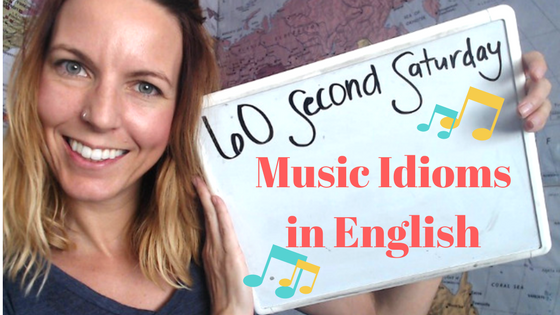
60 Second Saturday: Music Idioms in English
Is it necessary for English fluency to learn and use idioms? I’ve been asked some variation of this question quite often, and the answer is… yes! Native speakers use English idioms in their conversations, when speaking and writing, and in social, professional, and academic situations.
This is also true for phrasal verbs, but we’ll talk about that another day!
One of the ways I like to teach English expressions (idioms, phrasal verbs, and other vocabulary) is through context because I think it’s the most effective way to learn and remember. So before we begin our 60 Second Saturday lesson about music idioms in English, let’s see if you can define and understand the following idioms.
Are you a unique individual, someone who often dances to the beat of their own drum or do you like to follow the crowd? I know a lot of people who dance to the beat of their own drum and never think about what others will say, or how others will perceive them because they love being true to themselves and doing things their way. I’d love to know about you!
When’s the last time you did something bad and didn’t face the music and confess? It’s not uncommon for people to cover up the truth when they don’t want to admit that they did something wrong. However, sooner or later, most people feel too guilty to continue lying and need to face the music to feel better.
So, from context, can you define the idioms to dance to the beat of one’s own drum and to face the music?
Double check your understanding by watching this weekend’s lesson and get more examples and practice below!
Music Idioms in English
Let’s review the definitions and examples from the video.
to dance to the beat of (one’s) own drum
(*note: “one’s” will change to the correct possessive adjective: my, your, his, her, their, our)
to be unique, to be an individual, and do things your own way
Example: My best friend Holly is crazy! She’s always dancing to the beat of her own drum.
Additional Examples:
People who dance to the beat of their own drum are often happier because they’re not worried about others.
Gary always danced to the beat of his own drum when he was alive. I’ve never met anyone like him.
to face the music
to accept responsibility for something bad you have done
Example: I broke my mother’s window and I lied about it. But now it’s time to face the music. I need to tell her what I’ve done
Additional Examples:
It’s important to teach children to face the music when they’ve done something wrong.
Liars rarely face the music about things they do.
More Music Idioms in English!
The rest of this article has previously been posted here.
Learn through Context
This week’s English idioms are music to my ears, because the theme is something that I really love: music. I don’t want to toot my own horn, but I am really good at teaching idioms because I provide them in context! This will help you remember them for later. I hope all of these idioms are new for you, and none of them ring a bell.I don’t want to sound like a broken record, but idioms are important for everyday conversation in English. They will help you understand more native English expressions, and even make you sound more like a native speaker! With all of these English idioms to use and practice, you will want to be anywhere with bells on! Remember learning takes two to tango, so be sure to take the information I am giving you here, and practice using them in the comment section. Feel free to dance to the beat of your own drum, and be crazy and creative with your story! Alright now that you’ve read these idioms in context, be sure to read the definitions and extra examples below to help you really understand.
Definitions & Examples
1. music to my ears: something that is pleasing to hear, information you’re happy to hear
“I was so happy to hear that Krystal and Mike were getting married, that news was music to my ears!”
2. toot [one’s] own horn: to boast/brag, or say good things about yourself
“I don’t want to toot my own horn, but I got 100% on the quiz this week, and am the student of the month. I think I am the best student at the school!”
3. ring a bell: to sound familiar, something you’ve heard before
“Susan said we had met before, but I couldn’t remember her face. Although, her last name did ring a bell.”
4. like a broken record: to say the same thing over and over
“The teacher is always telling us to do our homework! She sounds like a broken record!”
5. be [somewhere] with bells on: be excited to be somewhere, arrive with enthusiasm
“Oliver’s wedding will be on the beach next month. I am so excited and will be there with bells on.”
6. it takes two to tango: an action takes two people with equal efforts to do something, a difficult situation where two people are equally responsible for blame
“After failing their partner project in class because Taylor was lazy, Paulo reminded him to work harder together next time because it takes two to tango.”
Practice Makes Perfect!
Write some of your own sentences in the comments below this blog, under the YouTube video or in your own notebook! Additionally, you can answer the following questions below, or use them with your conversation partner:
- Are you the type of person who dances to the beat of your own drum?
- When’s the last time you faced the music?
- Did any of these idioms ring a bell?
- Do you often toot your own horn?
- Who is someone who sounds like a broken record?
- What is something that takes two to tango?
Until next time,
Happy Studying! ♥
Do you know a friend learning English? Help me help them and share this lesson with them!
